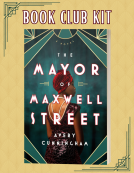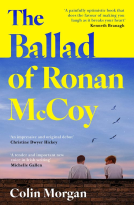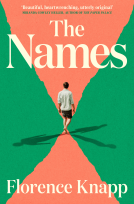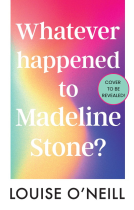
Djinn Patrol on the Purple Line
LONGLISTED FOR THE WOMEN’S PRIZE 2020
by Deepa Anappara
This title was previously available on NetGalley and is now archived.
Send NetGalley books directly to your Kindle or Kindle app
1
To read on a Kindle or Kindle app, please add kindle@netgalley.com as an approved email address to receive files in your Amazon account. Click here for step-by-step instructions.
2
Also find your Kindle email address within your Amazon account, and enter it here.
Pub Date 30 Jan 2020 | Archive Date 29 Feb 2020
Random House UK, Vintage Publishing | Chatto & Windus
Talking about this book? Use #DjinnPatrolOnThePurpleLine #NetGalley. More hashtag tips!
Description
‘Anappara creates an endearing and highly engaging narrator to navigate us through the dark underbelly of modern India’ Observer
We children are not just stories. We live. Come and see.
Nine-year-old Jai watches too many reality cop shows, thinks he’s smarter than his friend Pari (even though she always gets top marks) and considers himself to be a better boss than Faiz (even though Faiz is the one with a job).
When a boy at school goes missing, Jai decides to use the crime-solving skills he has picked up from episodes of Police Patrol to find him. With Pari and Faiz by his side, Jai ventures into some of the most dangerous parts of the sprawling Indian city; the bazaar at night, and even the railway station at the end of the Purple Line. But kids continue to vanish, and the trio must confront terrified parents, an indifferent police force and soul-snatching djinns in order to uncover the truth.
‘A heartrending tale’ The Times
‘A drama of childhood that is as wild as it is intimate’ Chigozie Obioma, Booker Prize shortlisted author of An Orchestra of Minorities
‘Extraordinarily good, deeply moving and thought provoking with brilliant characterisation. A very important book’ Harriet Tyce, bestselling author of Blood Orange
‘Extraordinary... moving and unpredictable... remarkable’ Washington Post
**One of the Observer’s 10 best debut novelists of 2020**
Advance Praise
'Djinn Patrol is storytelling at its best. The prose is not just sympathetic, vivid and beautifully detailed, but also completely assured and deft. We care about these characters from the first page and our concern for them is richly repaid'
Anne Enright, Man Booker Prize-winning author of The Gathering
'A brilliant debut'
Ian McEwan, Man Booker Prize-winning author of Amsterdam
'Deepa Anappara is a writer of considerable talent. This is a wonderful, energetic book filled with humour and pathos. Charming, sensitive and deeply moving'
Nathan Filer, Costa Prize-winning author of The Shock of the Fall
Available Editions
| EDITION | Other Format |
| ISBN | 9781784743086 |
| PRICE | £14.99 (GBP) |
| PAGES | 352 |
Average rating from 105 members
Featured Reviews
 Book B, Reviewer
Book B, Reviewer
A heartbreaking read but a realistic one. A story of the slums and child disappearances told through the eyes of a nine year old child. There’s a bit of a sense of adventure about it all too as Jai, the narrator has watched his favourite TV shows and wants to copy them. Childhood innocence makes this story read like YA at times but it also highlights the true horror of what is actually going on on Delhi’s streets.
Kids go missing all the time, we are told by one character and this doesn’t seem to surprise or horrify anyone. There’s a lot to think about here and I hope the novel will help raise the issues of missing Indian children and show up the extent of the scandal.
The group of friends in the book travel around the city and the stations on the purple line. They seem more bothered then the adults in the book. Adults who tell them there’s djinns who take children and that it’s happened for years. Djinns are a type of spirit or animal from folklore and so the story takes on quite a mythical tone when this cultural and spiritual belief systems is explored.
As well as the disappearances of the children, there’s also a great insight into the way life in the slums is portrayed.The day to day life there, how children cope, how they play etc and what they eat is all drawn with care and attention. The TV show they watch is of course the key which sparks off the whole story!
I found the main character very unique. You can tell he’s innocent of course at that age, but also street smart. You can tell he’s excited to solve crimes like his hero but doesn’t seem to be aware that he, too, could be a victim. Well you don’t think of crime like that at that age, do you?
A quirky read which will surely help to highlight the issues at the heart of it.
 Charles C, Reviewer
Charles C, Reviewer
DJINN PATROL ON THE PURPLE LINE - DEEPA ANAPPARA
I have read this novel through NetGalley in return for an honest review.
Had I been able to squeeze extra stars beyond the maximum five, I would have done so. Probably ten. Without doubt this has to be the novel I have enjoyed the most this year, and whose story will live with me the longest.
Most of the novel is told from the POV of a nine year old boy Jai who lives in one of the slums in an unnamed city in India. He is a great fan of police procedural programmes on television and when children who are his friends start to disappear he and his closest chums turn amateur detectives because the real police do nothing. This is his, and their, story.
The writing is superb. I can’t believe I have highlighted so many passages in one novel so that I can look back on them and savour them again. Not only do the characters themselves speak to you as real flesh and blood people, but India itself, the basti where they live, is so alive that you can taste and smell and feel it’s vibrations as though you are there: this has to be the most evocative writing I have had the pleasure to read in a long long time.
I’ve been looking through the passages I have highlighted in the hope that I could decide on one or two to quote. I can’t. There are so many. All I can do is implore you to read this novel: for the story of a little boy who - compared with children here in Britain- has absolutely nothing and yet despite poverty is cheerful and uncomplaining; and for the superlative writing.
Fingers crossed that a second novel is already brewing.
⭐️⭐️⭐️⭐️⭐️
5 Stars
'This story is a talisman. Hold it close to your hearts.'
I loved this book. It is heartwarming and deeply heartbreaking all at once. An atmospheric glimpse into an Indian basti from the perspective of a child obsessed with crime drama. Jai is the perfect protagonist for this, we see the world as he sees it- with the mysticism of youth and the anxiety of poverty.
Themes of escapism run deep in this novel, the chapters narrated from the perspective of the taken children are written to reflect different views on cultures and what is expected of them from their families.
After reading interviews from the author I can see that she not only perfectly captures the voice of a child but she also encapsulates the ongoing issues of human trafficking and religious violence in slum towns. Any character could have been the protagonist of this book.
Overall I think everyone should read this novel. I couldn't put it down. I haven't been this impressed with a debut novel in a long time.
To pre-order this book now for £14.99
Click Here and receive it when it's released on January 30th 2020.
Trigger Warning ⚠: Police negligence, religious violence, and educational values, human trafficking, child abuse.
I received an advance review copy for free via NetGalley in alliance with Chatto & Windus and Penguin Random House UK. I am leaving this review voluntarily 📚.
Told through the eyes of nine year old Jai, the novel explores the daily life of people living in the slums of an Indian city, it is thought provoking and deeply moving with endearing characters. The depiction of the everyday lives and struggles of the slum dwellers are vividly described and heart rending. The author has captured brilliantly the absolute essence of that way of life.
One of Jai’s school friends has gone missing and Jai’s love of the television show, Police Patrol, convinces him that he is the one to investigate along with his friends, Pari and Faiz. Jai ventures into some of the most dangerous parts of the city; including the bazaar at night, and the railway station at the end of the Purple Line. Children, including Jai’s sister, continue to vanish and the trio observe, frightened parents and an unresponsive police force.
Whilst parts of the novel are truly heartbreaking, there is also humour and wry observations only a nine year old boy could make about the adult world around him. I cared deeply about all the characters who really came to life along with the sights, sounds and smells of the city. This is an amazing debut from Deepa Anappara.
Thank you to NetGalley and Random House for an ARC in exchange for an honest review.
 Reviewer 203820
Reviewer 203820
When Bahadur, one of his classmates, goes missing, nine-year-old Jai is determined to solve this case. He has watched so many episodes of Police Patrol that he knows exactly how such a problem is to be treated. Together with his friends Pari and Faiz, he startsto investigate around Purple Line and Bhoot Bazaar. Yet, more and more children and teenagers disappear from their basti and quite obviously, the police are not willing to do anything about it. The parents get either more and more afraid of their children being the next or angry as they feel helpless and powerless.
Deepa Anappara’s novel is a brilliant mixture of an oftentimes very funny plot and an absolutely serious topic. Daily, children go missing on Delhi’s streets without anybody taking notice of it. The life of a child, especially if she or he belongs to a minority, is worth next to nothing, not even the effort to take a note on it. Diverse cultures and religious racism play an important role in this, too. Boys and girls are treated differently and offered different chances in life. Born into the wrong family, you can only count on superstition for a better life since the boundaries are clearly set.
At the beginning of the novel, I totally adored Jai and his friends. They are vividly and wonderfully portrayed. Determined to find out what happened to their friend and equipped with their knowledge from true crime TV series, they start their investigation ignoring all warnings against the dangers that lurk around the bazaar. They take their job very serious and at the same time, just as kids do, ignore the facts that they live in the same slum but come from very different backgrounds.
With the number of children who disappear rising, the novel becomes increasingly serious and loses the light-heartedness of the beginning. The way a slum works becomes gradually more visible and thus, the novel grants insight in a world which is totally unknown to me.
The whole novel is sparkling with life, the characters are quite unique and lovable and it is totally understandable why the novel has been nominated on the longlist for the Women’s Prize for Fiction 2020.
I adored this book! Wee Jai is such a sweetheart. I loved the plot, characters, setting, tone and language. Deepa Anappara has taken some very sad truths and spun them into the most glorious fiction. She provides a valuable insight into a place and culture I knew little about. The book is in turns humorous, heartwarming and heartbreaking. Simply brilliant!
 Reviewer 584002
Reviewer 584002
Djinn Patrol on the Purple Line is a genuine tale of life in the slums of India. Seeing the world through the eyes of 9-year-old Jai, who formed a detective group with his best friends, Pari the smart and resourceful girl and Faiz the hardworking Muslim boy, to search for the missing children in their basti. His parents work menial jobs for the hi-fi people and his sister Runu is busy training after school. As more and more children got kidnapped, Jai, Pari, and Faiz search for clues around the bazaar while trying not to get snatched themselves. Along the way, as new facts have come to light, their detective may have been useful to uncover what has been happening in their basti.
👁 ‘Yes, leave, that will be very easy for you to do,’ chachi says. ‘We’re the ones who have to be here, today and tomorrow and the day after that. This is our life you’re talking about as if it’s just some story. Do you even understand that?’ (p. 323-4) 👁
The writing style is unapologetically Indian, at first I didn’t completely understand half of the Hindi terms/phrases but I got used to them as I go—I loved the no italicisation! I feel like the narrative is remarkable because it does sound like what a 9-year-old would say and do. The last memories of the children up until they were snatched were also beautifully written. While some might find the story repetitive, it maintains the dark reality of the rampant missing children cases in India, which I think is very authentic and impactful. The disparity between the hi-fi and the basti people (caste), as well as corrupt police, ignorant religious leaders, and media indifference created a deep cleavage in the society, making the ordinary people point fingers at each other. The story also touched upon pop culture and patriarchal-rooted habits. It couldn’t have been easy to write such a rich social commentary into a fascinating fiction. My favourite part of the book is the stories/urban legend at the beginning of each part—THIS STORY WILL SAVE YOUR LIFE. By the end of the book I understood how the creative title came into being, Djinn Patrol on the Purple Line. Faiz blaming the djinns who are known to snatch children, Jai obsessing over the tv show Police Patrol, and the Purple Line train which could bring them to the city, an uncharted territory. All in all, it is such a strong debut novel, I would definitely be on the lookout for Deepa Anappara’s future works.
Thank you so much Chatto & Windus for the electronic ARC through NetGalley! ♥️
 Angela G, Reviewer
Angela G, Reviewer
Told through the eyes of a nine year old boy this is a beautifully written but heartbreaking story. This has really opened my eyes to the horrors and dangers for the children living in the slum towns of India. This book could have been solely about those dangers but I feel the impact was far greater told from the viewpoint of a child trying to find what had happened to other children. There was a beautiful innocence in this book and it has captured my heart.
Thanks to NetGalley and the publishers for the ARC in return for an honest and unbiased opinion.
 Librarian 431790
Librarian 431790
I could write and endless review or go for something short. I decided for a short review.
This book is excellent, it's heart wrenching and engrossing, it strucks a lot of emotional cords and you are not able to put it down because the storytelling is excellent.
Great characters, great plot and great descriptions of the slum life.
It was a great read, strongly recommended.
Many thanks to the publisher and Netgalley for this ARC, all opinions are mine.
Nine year old Jai lives in a basti at the end of the Purple Line. When his classmate goes missing, Jai decides to put all of his knowledge from Police Patrol and the TV crime series he watches to use, recruiting friends Pari and Faiz to help him.
At first the story seems fairly light-hearted and endearing, only tempered by the mythology of Mental's ghost and the conditions in which these children are working and living. Jai is a bit headstrong, but well-intentioned, and where his detective skills fail the conscientious and clever Pari, and street-wise Faiz make up for it. Along the way Jai adopts a stray dog who he names Samosa for the cart the dog sleeps under, just another example of the innocent, child-like wonder the world is seen through in this book.
However, Anappara has mastered how to lure the reader in, getting you to let down your guard, before packing an emotional punch. Her ability to inhabit the eyes of a child is remarkable, and is integral to how the novel works. If a story of child disappearances was told by an adult, or by someone in power it would be more factual, less emotional, whereas the children at the heart of this novel are discovering the world and trying to make sense of what is happening around them. However, in doing that, she doesn't shy away from the topic, and the implications of it; some of the situations and events witnessed by Jai would give Western parents heart attacks - and that is not a slight against parents in the basti, who do their damndest to protect their children, but cannot completely control the environment they live in.
In this way, the novel is an eye-opening social commentary on life in metropolitan India. The main characters of the novel don't even count themselves as being too badly off, compared to other children we see in the novel, Jai has a family, a roof over his head, food every night, he goes to school and doesn't have to work. We see a vibrant cast of characters across the story in terrible circumstances, children who work to support their families, women and daughters who cook, clean and care for those around them, but also a tight knit community who pull together to support each other.
Alongside the plot, the atmosphere and detail of the novel is so immersive, you can almost smell the scents of Bhoot Bazaar, and feel the oppression of the smog. There are a huge number of themes covered in the book, from class to gender roles, politics and religious violence to the more personal; growing up, loss, grief, fear. It is such a moving, heart-wrenching tale, with entire sections that will have you holding your breath. Through this stunning and inventive novel, Anappara forces you to think about the very real instances of children disappearing in India, everyday.
My thanks to Random House U.K. Vintage Publishing/Chatto & Windus for an eARC via NetGalley of ‘Djinn Patrol on the Purple Line’ by Deepa Anappara in exchange for an honest review. This is her debut novel and was published on 30 January.
“Three weeks ago I was only a schoolkid but now I’m a detective and also a tea-shop boy…”
In a shantytown (basti) in an unnamed Indian city, nine-year-old Jai lives with his parents and older sister. Jai attends school and hangs out with his friends. He is obsessed with the true crime reality show, Police Patrol.
When one of his classmates goes missing, Jai decides to use the crime-solving skills he has picked up from the show to find him. Along with his friends Pari and Faiz, Jai ventures into some of the most dangerous parts of the city including the bazaar at night and the railway station at the end of the Purple Line. As further children disappear from the neighbourhood the group wonders if one or more djinns might be responsible (hence the title).
Parents in the district are terrified and the police appear indifferent. The novel builds to a confrontation as the community seeks to assign blame.
Jai is the main narrator in this powerful coming-of-age novel though there is the occasional aside including from the children who have vanished just before something happens to them. This increases the tension while preserving the mystery.
I found this a deeply moving story, both heartwarming and heartbreaking. It started off with quite a comic feel as Jai and his ragtag gang seek answers and takes a darker turn by its closing chapters.
The Author’s Afterword states her background as a journalist reporting on poverty and religious violence in India. She relates the real world social issues linked to the disappearance of these children. It makes for sobering reading. She provided a list of her sources and also notes various organisations working for the welfare of India’s children.
This novel’s quirky title had initially attracted me though I became aware recently that It had generated quite a lot of prepublication buzz. I certainly feel that it is warranted. I would hope to see it recognised by this year’s literary prizes.
An important novel that is also a very engaging read. Highly recommended.
 Catalina S, Librarian
Catalina S, Librarian
A tender, heartwarming novel yet a harrowing read! A dichotomy, I know, but nonetheless true. Anappara talks about the harsh reality of poor Indian families living in slums, the corruption of governmental institutions(I really liked this hilarious yet evocative phrase describing the police: The letters P and O are missing from the Keep's side, so it reads LICE), the high rate of child abductions, illicit rings involved in child smuggling; social constrains especially for girls/women etc through the eyes of a group a children. I don't know about others, but I really love the world of children. I love how they see the world, how the explain to themselves what is going on around them, sometime in unexpected ways that fill you with wonder.
 Lesley S, Reviewer
Lesley S, Reviewer
I was sent a copy of Djinn Patrol on the Purple Line by Deepa Anappara to read and review by NetGalley.
What a fabulous book! Evocative, engrossing, tragic, emotive and ultimately informative, teaching westerners like myself about the way a whole slice of humankind must live – or should I say exist. Other novels such as A Fine Balance and Slumdog Millionaire (Q&A) have focused on the lives of India’s lower classes, but this novel is slightly different being taken from a child’s perspective with the fact of living in hardship and squalor being almost unquestioningly the norm. Beautifully written with authenticity, the author has really captured the essence of the characters’ lives and relationships while vividly painting the locations and even the smog that encompasses the whole story. I could go on about all the things that made this novel worthy of 5 stars - and more in my opinion – but I just recommend that you go ahead and read the book yourself!
 Sarah T, Bookseller
Sarah T, Bookseller
Oh my goodness what a read. I’m really glad that in advance I knew little of the story behind his novel and approached it very open to the contents.
A truly wonderful voice in 9 year old Jai who lives with his parents and sister in a slum dwelling in a city in India. Shining a profound child like view of the only kind of life he has ever known where family and friendship are everything. Whilst he can only imagine the lives of the those that live in the “hi-fi” buildings that they can see in the distant, Jai gives us an innocents view of life in the slums in India. The only life he has ever known.
The story takes a sinister turn as one of his friends goes missing.... and then another boy from the slum. Ignored by the police, we see the true lives of the “ underclass” in this city. We truly get a glimpse into the lives of the forgotten... but throughout told in Jai’s unique voice.
Truly moving and unforgettable. This is a remarkable novel.
 Daniya S, Reviewer
Daniya S, Reviewer
I enjoyed this book and the perspectives from which it were written really helped the story come to life. It’s a beautiful book to give a real picture of the lives of poor families in India but the subject matter is harrowing. A much needed insight into a largely hidden world.
Thanks for letting me review this book and highlighting the reality of these issues.
 Priya S, Book Trade Professional
Priya S, Book Trade Professional
Anappara writes with from the clear and innocent viewpoint of a child growing up in poverty and part of a strong community experiencing horrors that are rarely written about in Western media.
I loved almost everything about this book; the story was haunting, the narration was charming and I loved that there was no glossary to work out common parlance and the small bits of Hindi used.
I'm not a huge fan of the first person narrative but that's a me problem, and not something that detracts from the story in any way shape or form. If anything, the fact that I was kept engaged throughout the book is a testament to the strength of Annapurna's writing.
 Ruth M, Librarian
Ruth M, Librarian
Jai is nine, living in the slums of an Indian city with his parents and sister. He watches a lot of cop shows on TV, so when local children start to go missing, he decides that he and his friends Faiz and Pari should investigate - and he's in charge, despite Pari being cleverer than him (and she's the one asking the right questions). The police aren't that interested, and rumours fly about everyone who's disappeared, usually unfounded. But eventually, it's someone much closer to home who vanishes.
The divisions between the people who live in the basti and the "Hi-Fi" buildings where many of them work are really brought out, as is the corruption of the police and the various ingenious ways that the kids come up with to make some extra cash. Bits of the novel are funny, and Jai, Pari and Faiz are all lively characters - they shine off the page. The reality of life in the basti, even with loving parents, isn't hidden though, there's always a risk it might be demolished and the poverty is clear. Jai steals money from his parents purely to be able to catch the Purple Line into the city one day, and it takes him weeks to earn enough to repay it, but it's the equivalent of about £2.50. There are also clear tensions between Muslims and Hindus, when it seems like only Hindu children are disappearing, one of Faiz's brothers is blamed as it's clearly the Muslims' fault - and it's weeks before he's released despite his innocence. The corruption and lack of care for those in the basti is also very clear.
Overall, it's a novel with a lot of commentary about this aspect of Indian society, and a sad undercurrent which is offset with the humour and quirks of Jai. Recommended reading.
 Matthew T, Reviewer
Matthew T, Reviewer
Anappara's novel is a superb example of life in the slums of an Indian city - likely, I think, to be on the outskirts of Mumbai. The story revolves around the character of Jai who lives with his family - and his close female friend, Pari, as well as other young people. When children start to go missing without any explanation, Jai, Pari and the others set out to find out what has happened - seemingly, the police do very little, the dark alleyways of the slum, and the city, are dangerous, and there are far too many crooks waiting to force unsuspecting passer-by into sniffing glue, or an illicit substance which will send them to sleep.
The voice in the novel is convincing. Jai is only 9-years-old and this comes across through his naivete but also through his blinkered approach to his experiences. What is quite daunting is the way young people evidently have to deal with a lot in this developing country; they have to have their wits about them to evade capture; they are forced to grow up all too soon while still living the life of children.
The 'Purple Line' in the title is a metro line that they children travel on when they go into the city to investigate, as faux detectives. Most of the action takes place in Bhoot Bazaar, however, where the children live, where people work, where friends and enemies live cheek by jowl. It's later in the novel, when Jai's sister goes missing, that the personal element is really hammered home. No longer is it a friend from school or an acquaintance, which were bad enough disappearances - now, it is a family member and the story moves on to show the fallout such a horrific event can have.
'Djinn Patrol on the Purple Line' is original and clever. Lots of the language is from local dialects, showing, perhaps, the lack of self-editing that young people do when speaking. It is sad that young people, like Jai, have to get jobs, without their parents knowing, to pay for small things - one might imagine parents would be pleased but not so. This is an evocative story of life in one of the world's biggest, most developing and fast-moving countries - and what happens when a community is shaken by a series of disappearances.
There is a definite conclusion to the novel - one that is tragic and not one that I wanted to read. However, it is, perhaps, indicative of how many people go missing in India - and how they are never found. In our western, developed world, such issues seem a world away, and in some ways they are, but reading this novel has made me think about what millions of people go through every day.
 Tilly L, Reviewer
Tilly L, Reviewer
Djinn Patrol on the Purple Line is about Jai and his sidekicks Pari and Faiz, who are trying to solve the disappearances of children from their slum. Nine-year-old Jai is obsessed with reality detective shows and his classmate, Pari, already possesses an analytic mind. The trio is rounded off with Faiz, a Muslim who often skips school to work at several jobs in the bazaar.
.
The action revolves around the circumstances of each disappearance and allows the events to unfold while showing the reality of Jai's life. The characters are poor beyond comprehension and they include Jai’s sister Runu who has ambitions of becoming a star athlete and their anxious Ma, a cleaner for a disagreeable woman who threatens ‘to chop her into tiny-tiny pieces and chuck slices of her over the balcony.’ In the background is the constant fear that bulldozers will flatten their homes during one of the slum clearance campaigns.
The children look for answers, but the number of disappeared children keep piling up. The novel is structured around the events of each disappearance, written from the victim’s perspective.
Initially the unfamiliar Hindu phrases confused me but eventually I got the unfamiliar words in context and it made the novel fell more authentic.
Djinn Patrol shares some of the same themes as Slum Dog Millionaire, where gangs kidnap poor children, blind them and force them to beg. In the postscript Anappara explains how more than 180 children go missing every day. Lion also references child abductions and Aravind Adiga’s White Tiger shows how corruption is at the heart of life in India. The non-fiction Beyond the Beautiful Forevers details life in a slum close to the Mumbai airport.
They all share a horrific picture of modern India—a society divided between extreme wealth and extreme poverty. It is a world of endemic corruption, where the law is driven by those who can pay for it. In Djinn Patrol, the impoverished families have to bribe the police to investigate their children’s disappearances and the police still do nothing. Towards the end, I was on tenterhooks hoping for a happy ending.
This is an a heartbreaking account of the fragility of life and how people carry on day to day in the face of such hopelessness.
Readers who liked this book also liked:
We Are Bookish
Historical Fiction, Literary Fiction, Multicultural Interest
Rick Riordan; Mark Oshiro
Children's Fiction, LGBTQIA, Teens & YA



















